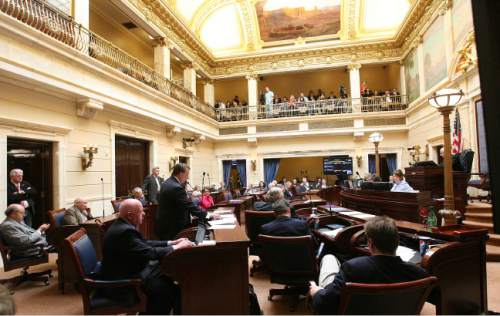This is an archived article that was published on sltrib.com in 2015, and information in the article may be outdated. It is provided only for personal research purposes and may not be reprinted.
House Republicans are expected to pull the plug Tuesday afternoon on the latest attempt to expand health coverage to tens of thousands of low-income Utahns, with one representative anticipating the supporters of the expansion plan could be counted on both hands.
Republicans in the House are scheduled to meet in a closed-door caucus to determine whether there is enough support to warrant a special session later this month.
If the latest proposal is defeated, as expected, legislative leaders will have to grapple with what to do next.
Utah Access Plus was the product of months of negotiations between legislative leaders and Gov. Gary Herbert. It calls on health care providers — doctors, hospitals, pharmaceutical companies and others — to pay about $50 million to bring in $450 million of federal matching funds in order to subsidize health coverage for about 95,000 of Utah's poor.
But it has run into a buzz saw of opposition from the providers and skeptical Republican House members who had already killed Healthy Utah, a similar coverage plan devised by Herbert.
"I'm like Yogi Berra, that great philosopher, who said 'I don't like to make predictions, especially about the future.' I don't know what's going to happen in the House," Herbert said, although he appeared to be looking past Tuesday's House Republican gathering. "What we've got on the table now may not be acceptable, but there may be more than one or two or three ways to skin the cat."
Herbert said it would be "a very bad option for the taxpayers and people of Utah to do nothing."
Rep. Ray Ward, R-Bountiful, a doctor who was a leading proponent of Herbert's Healthy Utah plan, said he thinks it is "extremely unlikely" that Utah Access Plus would have the support it needs.
"It seems to have less support than Healthy Utah did. I don't think that's a surprise. You put that number of taxes in and you stir up a lot of people against it," Ward said.
Just 10 House Republicans voted for Healthy Utah during the legislative session earlier this year. House Speaker Greg Hughes, R-Draper, has insisted that all 38 votes needed to pass any expansion bill must come from the 63 Republican members in the House, dismissing the dozen Democratic votes entirely.
And there has been very little muscle behind pushing Utah Access Plus. Hughes promised not to lobby his colleagues, and the governor has not been meeting with representatives to lobby for support.
Senate President Wayne Niederhauser, R-Sandy, said leaders in his body have been polling members on their support and he should know by Tuesday afternoon where the Republican senators are on the bill.
He said he is letting members make up their minds and gauge what might need to be done next.
"I think we at least want to take the barometer first and see what needs to be done, which means getting votes or making adjustments to the proposal," he said.
And if Utah Access Plus fails, Niederhauser said, "it would be time for the speaker and governor to get back together and see what it would take to pull it together."
Rep. Mike Noel, R-Kanab, said he remains undecided on the proposal, but he worries about how much the program would cost and whether it can be sustained.
"I think the conservatives are still concerned about tying in with this federal government program. … We want to help those who are in need, those who can't get insurance," Noel said. "There are just too many requirements and too many issues with getting involved and trying to fix this thing."
The Utah Health Policy Project, which has advocated for Medicaid expansion, plans to bring several Utahns to the Capitol to explain how the coverage would change their lives. RyLee Curtis, a UHPP Medicaid analyst, remains optimistic the Legislature will find a way to cover the uninsured, even if it doesn't happen Tuesday.
"I'm optimistic that Utah and Utah lawmakers are eventually going to be able to do the right thing," she said. "There's enough public support for this issue … if things go sour tomorrow the issue is not going away."
"Just because legislators don't decide to move forward with this issue tomorrow doesn't mean [sick people's] illness goes away," Curtis said.
Twitter: @RobertGehrke



